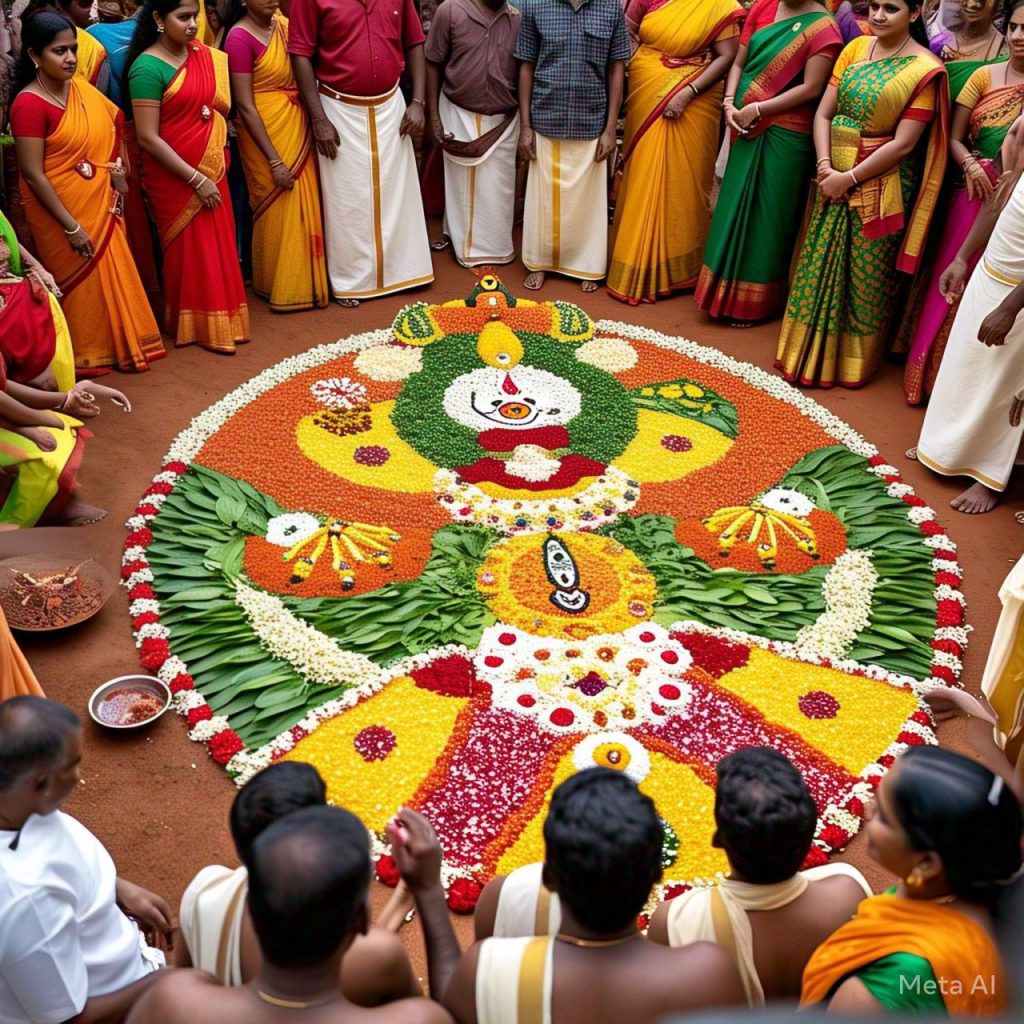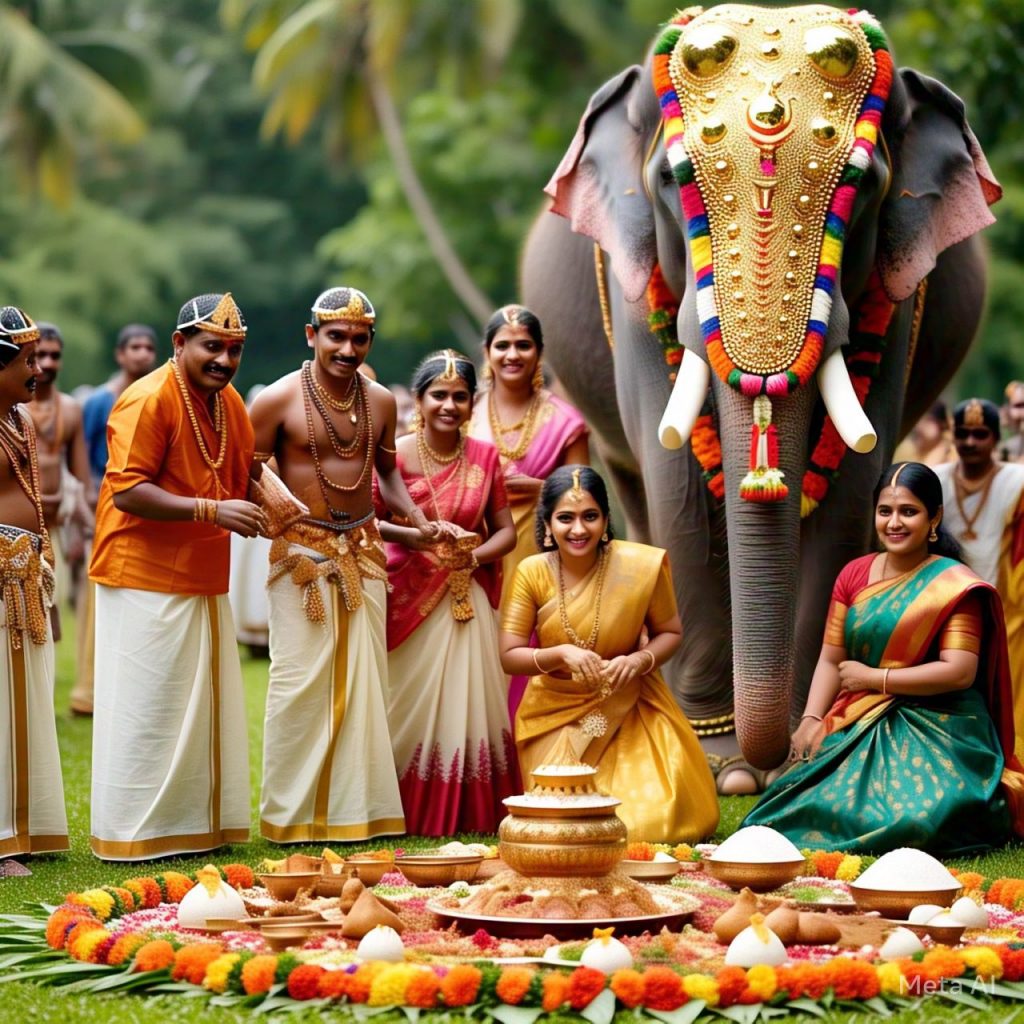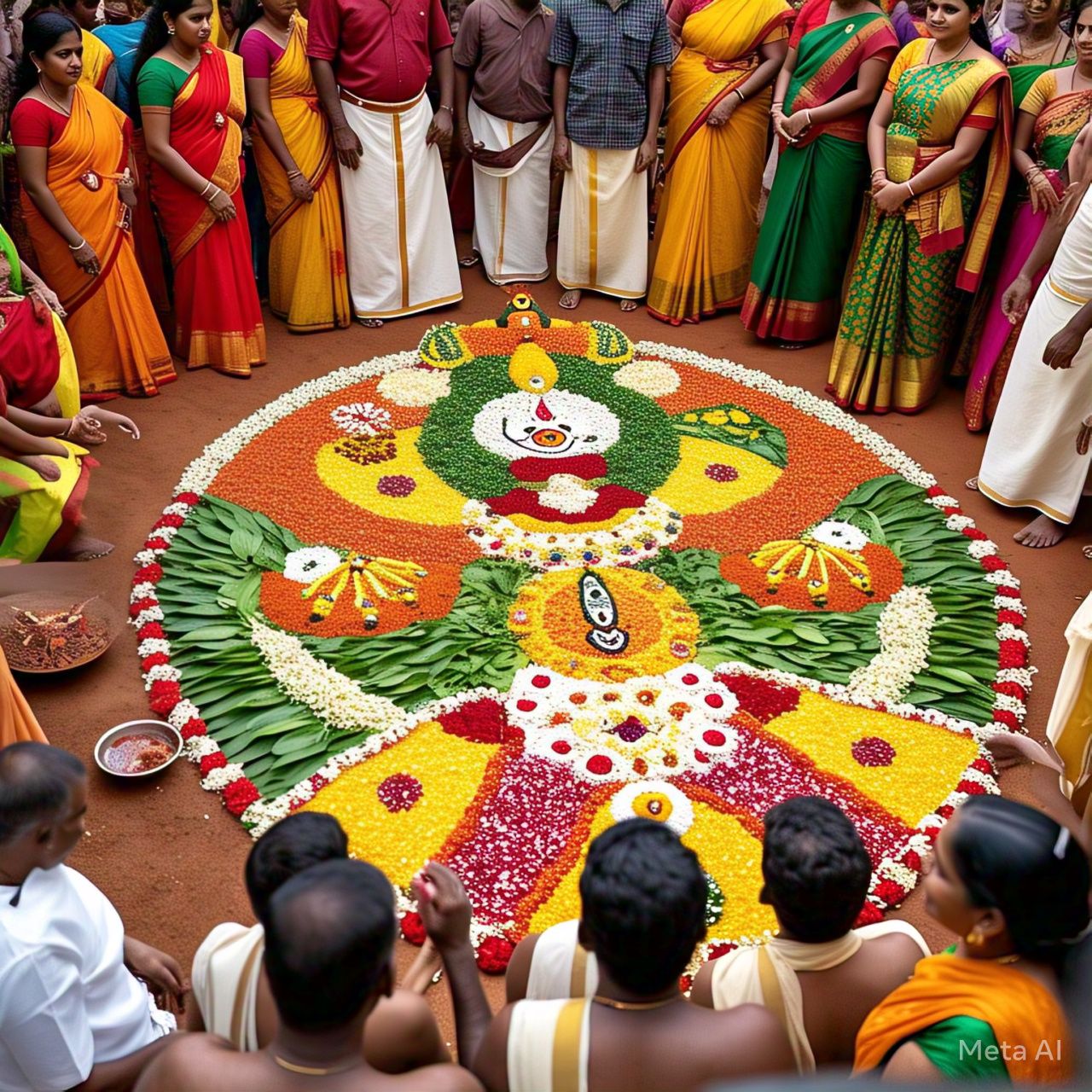Onam isn’t just a festival—it’s a feeling that fills every home in Kerala with joy.
As the scent of fresh flowers mixes with the rhythm of traditional drums, families come together to celebrate the return of the beloved King Mahabali. From vibrant Pookalams (flower rangolis) to the grand Onam Sadya (feast), every moment is about love, unity, and tradition. Whether you’re in Kerala or far away, Onam brings with it a reminder of home, heritage, and happiness.

Onam has arrived.
Each year, as the rains start to recede and the rich greens of Kerala shimmer in the golden light, something enchanting starts to awake in the atmosphere. The fragrance of newly swept homes, the beat of boat races, the ring of laughter in coconut groves — only one thing could it mean.
Onam has arrived.
But Onam isn’t a celebration. It’s a sentiment. A homecoming. A reaffirmation of all that’s pure and divine in life — love, being together, appreciation, and above all, home.
At the heart of Onam is the story of King Mahabali — a demon king in name, but a god in action. Beloved by his people, revered for his generosity, Mahabali’s rule was so just, so kind, that even the gods grew insecure.
It’s said that when Lord Vishnu, in his avatar as Vamana, visited the earth and asked Mahabali for three steps of land, the king — noble as ever — agreed. And with those three steps, Vamana covered the heavens, the earth, and finally, Mahabali’s head.
But Vishnu was touched. Swayed by the devotion of Mahabali towards his people, he wished to fulfill one desire of him — to come back once a year to visit his kingdom, to visit the people who still yearn for him.
The day of return is Onam.
And guess what? It doesn’t quite feel like a myth. It feels like reality. Because Onam, in all possible ways, feels like a coming home. Home to innocence. Home to culture. Home to roots. To the kind of happiness that’s not purchased, but experienced.
The Spirit of Onam — Not a Day, but a Season
Onam is not a one-day phenomenon. It’s a 10-day celebration, beginning with Atham and concluding in Thiruvonam, each day having its own significance, rituals, and affection.
Individuals clean their houses not only for appearances — but as a means of saying, “Mahabali, if you come to visit us, we want you to see the best of us.”
Isn’t that lovely?
It’s like cleaning your soul as well — ridding yourself of old resentments, lighting new lamps, and opening your heart to joy.
The Onam Pookalam: A Garden of Emotions
Each day of Onam, families add fresh layers to the pookalam — a flower design that begins small and blossoms into something magnificent by the last day.
It’s not just art. It’s purpose.
It’s like narrating a story with petals — of growth, of patience, of coming together. I recall sitting cross-legged with my cousins, deconstructing marigold and hibiscus petals, giggling as we ruined designs, correcting one another softly. No Instagram, no phones. Just us, and the smell of flowers. That’s what Onam does — it brings you back.
The Onam Sadya — Not Just a Feast, But a Hug in Banana Leaves
Let’s discuss Onam Sadya — because oh, what a feast!
A majestic vegetarian feast on banana leaves, with as many as 26 dishes, lovingly prepared — avial, olan, sambar, thoran, pachadi, and of course, the queen of the table — payasam.
But this is the catch — it has nothing to do with food. It’s about love on a leaf.
It’s about sitting together, exchanging chutneys, laughing, joking with one another about how much pickle you had. It’s about belonging. Community. That feeling when you think — this is home.
Even if you’re miles away from Kerala, when someone invites you for a sadya, you sense that warmth. That generosity. It reminds you — “You are important. Come join us for a meal.”
What’s an Onam Celebration Without a Little Thrill?
Enter the Vallamkali — the iconic snake boat races that happen during Onam. Long, sleek boats gliding through the waters with rhythmic paddling, 100+ men moving like one — it’s a sight that stuns you, no matter how many times you’ve seen it.
But more than competition, these races show team spirit. Villages come together to prepare these boats for months. The unity, the songs, the chants — it all becomes one big heartbeat.
It’s not about winning. It’s about rowing together.
Homecoming and the Heartfelt Essence of Onam
You’ll hear it from every Malayali — Onam means coming home.
It’s when humans travel to the other side of the world, ride trains for hours, fill suitcases with clothes yes, but also memories to be re-lived.
I recall I once asked a friend, “Why do you go home every Onam?”
She smiled and replied, “Because if I don’t, it feels like Mahabali’s missing someone too.”
And that’s what makes Onam special. It’s not a festival you celebrate. It’s a festival that celebrates you. Your presence. Your roots. Your belonging.
Onam in Today’s World — Why It Still Matters
In an age where everything seems hurried, digital, and far away — Onam reminds us to slow down.
To sit with our families. To cook together. To decorate with intention. To serve with love. To smile without filters.
You don’t need to be Malayali to feel Onam. You only need to hold on to goodness. In the belief that a benevolent king still keeps us in his watch, and returns annually to inquire about our hearts.

The Legend of King Mahabali – The Soul of Onam
Long ago, Kerala was ruled by a mighty and wise king named Mahabali. He was a demon king (Asura), but unlike the usual tales of tyranny, Mahabali was kind, generous, and deeply loved by his people. Under his rule, the kingdom flourished — there was no poverty, no lies, and no discrimination. It was a golden age of peace and prosperity.
But Mahabali’s growing popularity made the gods uneasy. They feared that his influence would soon rival the heavens. So, they sought help from Lord Vishnu, the protector of the universe.
